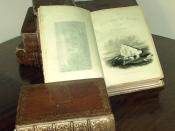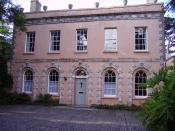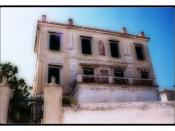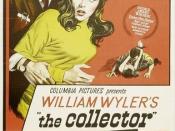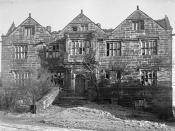Library Report, The Collector Syhamal Bagchee in his article "The Collector: The Paradoxical Imagination of John Fowles"� finds The Collector to contain pronounced thematic and moralistic content in context to modern society. Bagchee dismisses the novel as entirely symbolic though various symbols of the most predictable kind are used such as: dead butterflies, paintings, photographs, and sunlight. The novel addresses social and moral problems through these symbols. Not as obvious are the literary and linguistic allusions of the references to Miranda, Caliban and Ferdinand. The derivation of Clegg's name is from "clef"�, which means key.
Bagchee analyzes Foster's dual narrative technique as "highly ironic"� as well as "revealing a somber and frightening view of life's hazards"� (167). The two narrations by Clegg and Miranda are surprisingly similar not only in their physical descriptions of incidents that take place, but display similar attitudes or beliefs. For example, both Miranda and Clegg both do not believe in God.
John Fowles himself is an atheist and uses Clegg as a spokesman for his views.
Bagchee finds irony in many circumstances and events in the novel, especially that of Miranda's character: "Miranda seals her own fate by being herself"�(167). In other words, each escape attempt and each verbal abuse alienates Clegg more and more. Clegg is not predisposed to hating Miranda, but after Miranda's attempt at seducing him and insulting his sense of masculinity, an apparent, drastic change is noticed in Clegg. Clegg is not the same person he is at the beginning of the novel.
Bagchee finds love as an appropriate theme of the novel despite its tragic ending. Though Clegg's love is timid, self-effacing, dreamy, and idealistic, it is the love that causes terrible and irreversible destruction to Miranda. Clegg values Miranda more than his own life and feels as though he needs her in order to live. He realizes shortly after taking her into captivity that he cannot ever let her free. There are times of harmony between the two characters, especially when Miranda reluctantly realizes that she often enjoys when Clegg visits her; it helps relieve the loneliness. The "romantic hero"� in this novel is George Paston, whom we learn about through Miranda's diary entries. "Paston is the object of Miranda's love, devotion, and admiration"� (168). She often judges ideas, people and art in terms of his ideas. Her love towards Paston is neither sexual nor financial; he captivates her mind and is sort of a teacher-inspirer-enchanter figure to her. This sort of figure is common of Fowles's works and Paston is the first of such.
Power and freedom are other central themes found in The Collector. The power and control used by Clegg is a central issue in the novel. Miranda's struggle to escape as well as the struggles to keep her mind and soul free is another aspect of the novel. Power is less realized in the relationship between Miranda and Paston (169).
In Bagchee's final analysis of The Collector, he acknowledges that the novel contains a relatively complex philosophy of life, and a thorough ironical technique (169).
Annotated Bibliography Bagchee, Shymal. "The Collector."� Contemporary Literary Criticism 33 (1995): 166-169.
(See paper for details) Burton, Robert S. "John Fowles."� Reference Guide to English Literature (1991): 586- 587.
Burton writes about Fowles as a writer and the paradoxes in his writings. Fowles "fashions his writings on cultivating and living with paradoxes"�. Often there is an "elusive mystery or puzzle that the rational powers of science cannot account for"�. Ferdinand Clegg from The Collector is the antithesis of Fowlesian hero. He resists mystery by reducing it to "mechanical explanation"�. Clegg imprisons and categorizes Miranda in the same way in which he methodically and heartlessly collects butterflies.
Costa, Dominique. "The Collector."� Contemporary Literary Criticism 87 (1991): 184- 187.
Two specific narrative devices are used in The Collector: voice and focalization. Clegg presents the voice and the perspective of the narration (from either Clegg or Miranda) presents the focalization. Costa speaks about the effects of using a double-narrative technique and the effects on the reader. Clegg is portrayed as an unreliable narrator- such as calling Miranda his "guest"� instead of prisoner. He only wants Miranda's image and is not interested in her self- the same outlook he has towards butterflies. Language is used by Fowles to reveal the depths of the narrators' characters, emotions, and intellect.
Gindin, James. "John Fowles."� Contemporary Novelists (1991): 319-321.
In Gindin's critique, he describes Fowles as a "highly allusive and descriptive novelist."� In all of his fictions, situations and settings are carefully done. Fowles often manipulates the sense of reality to portray the central themes of his novels. In The Collector, Fowles "attempts to probe psychologically and sociologically"� to demonstrate what a young man of one class was driven to collect, imprison and dissect the girl from another class whom he thought he loved. Gindin brings up the point that Clegg was only interested in what he had seen of Miranda from afar- her image, but not in what lay within. Clegg speaks of the photographs he takes of Miranda; how they look so lovely and do not speak back- just the way he loved her.
Pifer, Ellen. "John Fowles."� Dictionary of Literary Biography 14 (1983): 309-336.
Pifer's interprets The Collector to have a theme of "having"� which has overtaken modern industrial society. "Much confusion in contemporary values- society's failure to distinguish the urge for control from the liberating power of love"� is the message Pifer received from the novel. Clegg is the true prisoner; afraid of feeling, human contact, and of anything that is alive within.
Olshen, Barry N. "The Collector."� Contemporary Literary Criticism 33 (1978): 163-166.
Olshen's critique on The Collector provided interesting insight to the conflict within the novel of the "few"� and "the many"�. Miranda classifies herself of the "few"� and Clegg as Caliban who is apart of "the many"�. Power is the primary force governing the relationship between Miranda and Clegg. George Paston's philosophies reflect Fowles's own. The occasional bits of humor do not provide comic relief, but instead "augment the feelings of anxiety and menace."�
